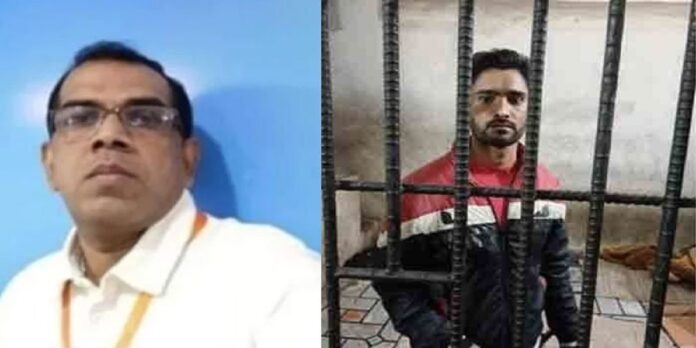Nasir Khusraw was an Ismaili preacher, scholar and Persian poet. However, it is also a fact that his travelogue has been more popular than his religious, literary, and worldly writings.
In one of his travels to Mecca and Egypt, he writes that he stopped at a cobbler’s shop in the bazaar of Khorasan to get his shoes repaired, a crowd began to gather in the market.
There was noise, and most of the people started running towards it. The cobbler also stopped working and ran to the same place. Khusraw waited. When the cobbler came back, he had a piece of fresh meat in his hand with blood dripping from it.
When the Persian poet inquired, Cobbler proudly replied that it was Nasir Khusraw’s disciple who was caught by the Muslims. People killed the man with the intention of reward and Islamic spirit, his body was dismembered. Intending to prove his faith and blessings in the court of Allah Almighty, the Cobbler also got the piece of the student’s body.
Nasir writes, “I kept thanking God in my heart that Cobbler did not know that Nasir Khusraw himself is also present here. Otherwise, if this is the condition of my student, what would have been the consequences for me?”
Like the followers other religions, Muslims also have a history of killing and lynching in the name of religion.
Over time, Islamic Jurisprudents legalized orthodoxy and the blasphemy laws. Many Pakistanis and Muslims think that Blasphemy laws and implementation of Sharia is a reaction towards imperialism while history tells us that facts are different.
Abbasid Caliph Haroon ur Rasheed once questioned Jurisprudents that why the Taghlib tribe wasn’t killed when Caliph Umar Bin Khatab had ordered them to make their future generations Muslims and the tribe hadn’t kept the promise. Jurisprudents said the punishment can’t be awarded as the caliphs after Umar hadn’t emphasized this punishment.
In the 11th century, Imam Ghazali punished many free-thinkers and philosophers on the charges of apostasy and blasphemy. After this many used his theology to punish anyone who was deemed a threat to the Orthodoxy. Almost all schools of thought and sects of Islam agree that the punishment of blasphemy is death.
Moreover, if someone rejects Islam for atheism or any other religion, Sharia has no order except death penalty for this apostate. If you tell even African villagers that we will kill you, if you leave our religion after accepting it, how many of them are supposed to pronounce Kalma e Tayyiba? .
More than 200 years ago, Muslims would have either killed or enslaved such a village even if they won’t agree to turn Muslims.
In the Sub-Continent, Islamic religious clerics had asked the ruler of the time to kill all the Hindus and other infidels who weren’t willing to turn Muslims. In the era of Akbar, Non-Muslims were forgiven Jizya, a tax that was specified for the Non-Muslims living in an Islamic country. Akbar introduced his religion that was quite soft and acceptable for all religions. Religious clerics opposed these reforms and challenged the Mughal kings.
When the Mughal empire was weakened to the extent that any chance of its revival looked like the dream of a madman, Shah Wali Ullah invited Afghan King to rule over Sub-Continent because in Shah’s view, his monarchy was better than the rule of a Non-Muslim. In Islamic jurisprudence, if a Non-Muslim rules an Islamic country, it can’t be considered to be an Islamic country anymore.
It is in the constitution of Pakistan that a Non-Muslim can’t become the President or Prime Minister of the state. You would never like such a law if you were a born citizen of a country but the law stops you from becoming the Chief Executive of your motherland.
In the Pakistan movement, slogan of Islam of used. Therefore, all the religious clerics believed that there would be the true implementation of the Sharia laws as Quaid e Azam Muhammad Ali Jinnah had already declared that Muslims wanted Pakistan to practice Islam with its true spirit. In 1949, Objectives Resolution was passed by the constituent assembly, declaring Pakistan as Islamic Republic.
Zulfiqar Ali Bhutto required the support of Jamat e Islami’s Maulana Abu’Ala Maududi to pass 1973 constitution so he had to compromise on a lot of things. Maududi considered it a great achievement for him and his Jamat e Islami. In his view, they had changed the course of history by turning Pakistan into the Islamic Republic.
It was Zulfi Bhutto’s government when Ahmadis were declared Non-Muslims and they were banned from performing their religious activities. Ahmadis were killed by Sunnis and Shias in many parts of the country and these incidents helped Qadianis find asylums in Europe. In 2016, when government hanged Mumtaz Qadri who had killed Governor Punjab Salman Taseer eleven years back, many who supported Qadri took to the streets.
Next year, in 2017, people of similar ideology killed Mashal Khan in Abdul Wali Khan University, Mardan. The young man was speaking against his university administration and conservative groups at the campus. He was accused of blasphemy but there was evidence in favor of the arguments of the mob. Many people were arrested. You can punish individuals not the mobs.
For the past few years, Tehreek e Labbaik Pakistan (TLP) is a visible political force and and registered itself as a significant religious movement inPakistan. The state’s inability to counter it and other terrorist organizations like TTP and ISIS is another truth.
The state can punish some people, but it can’t open its guns on its public. In the case of TLP, there have been thousands of people on the streets, and there are millions who support their cause whenever it gave a call.
Recently when Priyantha Kuamara was lynched by a factory mob in Sialkot, they were chanting slogans used by TLP. It is impossible to write everything about the weaknesses of the state and the threat laying in the country in the form of religious fundamentalism.
People can now understand why the Sialkot factory’s mob killed Priyantha Kumara, and why we can expect such incidents in the future as well. The issue is in the political interpretation of our religion.
Read more: Lynching of individuals on blasphemy charges casts harsh spotlight on religious extremism


